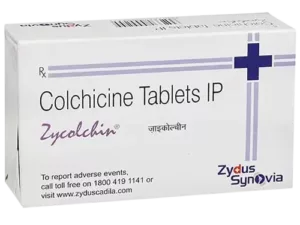COLCHICINE
Buy Colchicine Tablets- Safe and Effective Treatment for Gout
Important: The following information is for educational purposes only and is not a substitute for professional medical advice. Always speak to your healthcare provider for guidance specific to your condition. Colchicine is a prescription-only medicine and should be used strictly under medical supervision to avoid health risks. Misuse or incorrect colchicine dose can lead to serious side effects.
Showing the single result
What Are Colchicine Tablets?
Colchicine tablets are a well-established prescription medication mainly used to treat and prevent painful gout attacks. Gout is caused by the accumulation of uric acid crystals in the joints, which leads to swelling, inflammation, and intense discomfort. Colchicine works as an anti-inflammatory agent, helping to control this crystal build-up and reduce inflammation.
This medicine has been in use for centuries for gout treatment and continues to be one of the most trusted options for managing the condition. In addition to gout, it can also help with certain rare inflammatory conditions when prescribed by a doctor. Many patients choose to buy colchicine as part of their ongoing treatment plan because of its proven track record in controlling flare-ups.
How Colchicine Works
Colchicine acts directly on the inflammatory process that occurs during a gout flare-up. When uric acid crystals trigger an immune response, white blood cells rush to the affected joint, causing swelling and severe pain. Colchicine helps block the movement of these white blood cells to the inflamed area, reducing swelling and easing discomfort.
Because it targets the underlying inflammation rather than just masking pain, a correctly prescribed colchicine dose can provide faster and more effective relief during an acute gout episode and also help prevent future recurrences.
Uses of Colchicine Tablets
Primary Uses:
- Treating sudden gout attacks
- Preventing repeated gout flare-ups
- Treating familial Mediterranean fever (FMF)
- Managing Behçet’s disease in certain cases
Off-Label Uses (as prescribed by a doctor):
- Preventing pericarditis (inflammation of the heart’s lining)
- Treating other inflammatory conditions based on medical assessment
Colchicine Dose for Gout Attack
The colchicine dose for gout treatment depends on whether it’s used for immediate relief or prevention. It is important to strictly follow your doctor’s directions, as dosage can vary depending on your medical history, kidney function, and other factors.
For Acute Gout Attacks:
- Initial dose: Usually 1 mg (two 0.5 mg tablets) at the first sign of symptoms
- Follow-up dose: 0.5 mg one hour later
- Do not exceed: 1.8 mg total in 24 hours
- Duration: Often continued for a few days until the attack subsides
For Gout Prevention:
- Typical dose: 0.6 mg once or twice daily
- May be prescribed long-term in patients prone to frequent flare-ups
Important: Taking more than the recommended colchicine dose can be dangerous and lead to serious health issues.
Who Should Take Colchicine?
Colchicine may be suitable for:
- Adults experiencing sudden gout attacks.
- Patients with a history of repeated gout episodes.
- Those requiring preventive treatment for gout.
- People diagnosed with familial Mediterranean fever or certain other inflammatory conditions, as assessed by their doctor.
Who Should Avoid Colchicine?
You should not take colchicine if you have:
- Severe kidney or liver problems
- Certain heart conditions
- Blood disorders
- Known allergy to colchicine
- Pregnancy or breastfeeding (unless prescribed and closely monitored)
Possible Side Effects of Colchicine
Like any medication, colchicine can cause side effects.
Common Side Effects:
- Nausea
- Diarrhea
- Abdominal pain
- Loss of appetite
Serious Side Effects (Seek medical help immediately):
- Severe vomiting or diarrhea
- Muscle weakness or pain
- Unusual bleeding or bruising
- Fever, chills, or other signs of infection
- Breathing difficulties
Important Safety Information
Before starting colchicine:
- Inform your doctor of all medicines you are currently taking.
- Mention any history of kidney, liver, or heart problems.
- Disclose if you are pregnant, planning pregnancy, or breastfeeding.
- Tell your doctor if you have any blood disorders.
Drug Interactions: Colchicine may interact with antibiotics, antifungals, and certain heart medications. Always give your doctor a complete list of your current prescriptions and supplements.
FAQ
Colchicine is a prescription medicine mainly used to treat and prevent gout attacks. It reduces inflammation caused by uric acid crystal build-up in the joints. Doctors may also prescribe it for conditions like familial Mediterranean fever (FMF), Behçet’s disease, or pericarditis.
Colchicine blocks the movement of white blood cells to areas where uric acid crystals cause inflammation. This helps reduce swelling, pain, and discomfort during a gout attack and can also prevent future flare-ups.
Yes, when taken in the correct prescribed dose for gout prevention, colchicine can be safe for long-term use. However, regular medical monitoring is necessary to avoid complications.
Seek immediate medical help if you experience severe vomiting or diarrhea, muscle weakness, unusual bleeding or bruising, fever, or difficulty breathing.
Medical Disclaimer
This content is intended for informational purposes only and is not a substitute for professional healthcare advice. Always consult a licensed medical practitioner before starting, stopping, or changing your medication, including adjustments to your colchicine dose. Self-medicating or taking an incorrect dose can cause serious side effects or complications. Your doctor will determine the most appropriate colchicine cost, duration, and dosage based on your health needs. Never purchase or use colchicine without proper medical supervision.

